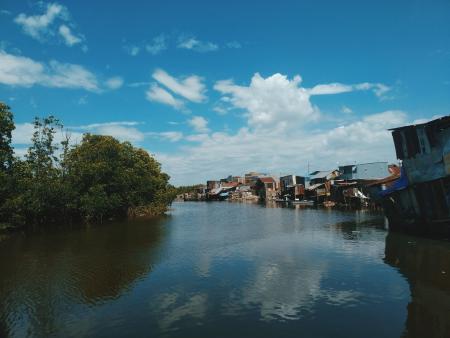
Area characterisation:
The area of Makassar, Indonesia has 1.53 million of inhabitants and a geographic area of 199 km². 58,200 households live in formal settlements without access to centralized urban infrastructure and face threats from climate change.
Objective:
The pilot project aims to reduce the impact of climate change on marginalized communities by providing localized, water-sensitive interventions that address issues related to sanitation and water management.
Financing:
Financing is provided by the ADB-managed Urban Climate Change Resilience Trust Fund and the Southest Asia Urban Services Facility. The total amount is 196,000.00 US$ from the Urban Climate Change Resilience Trust Fund under the Urban Financing Partnership Facility and 329,000.00 US$ from the Urban Environmental Infrastructure Fund under the Urban Financing Partnership Facility.
Potential impacts/benefits:
The Revitalising Informal Settlements and their Environments (RISE) initiative will reduce contamination and restore the natural processes of the area. The project’s beneficiaries and their needs will be empowered and taken in account by community-driven development approaches. Sanitation and reliable water supplies will make possible a better community health, with an increasement in food production and fewer infections and water-related diseases. The total people that will receive an improved sanitation and water management will be about 1.6k people.
Actions:
Located specific nature-based solutions, including wetland restoration, bio-filtration gardens, stormwater harvesting, paved paths, and new sanitation structure to improve wastewater management and diverse water resources.
Global goals:
-
6. Clean water and sanitation
-
10. Reduced inequalities
-
11. Sustainable cities and communities
-
13. Climate action
-
16. Peace and justice and strong institutions
NBS goals:
- Restoring ecosystems and their functions
- Improving risk management and resilience
- Multi-functional nature-based watershed management and ecosystem restoration
- Nature-based solutions for increasing the sustainable use of matter and energy
- Nature-based solutions and the insurance value of ecosystems
NBS benefits:
- Developing climate change adaptation; improving risk management and resilience
- Increase infiltration / Water storage
- Developing climate change mitigation
- Improve connectivity and functionality of green and blue infrastructures
- Increase Biodiversity
- Increase quality and quantity of green and blue infrastructures
- Improve water quality
- Increase communities’ sense of ownership
- Increase well-being
- Increase willingness to invest in NBS